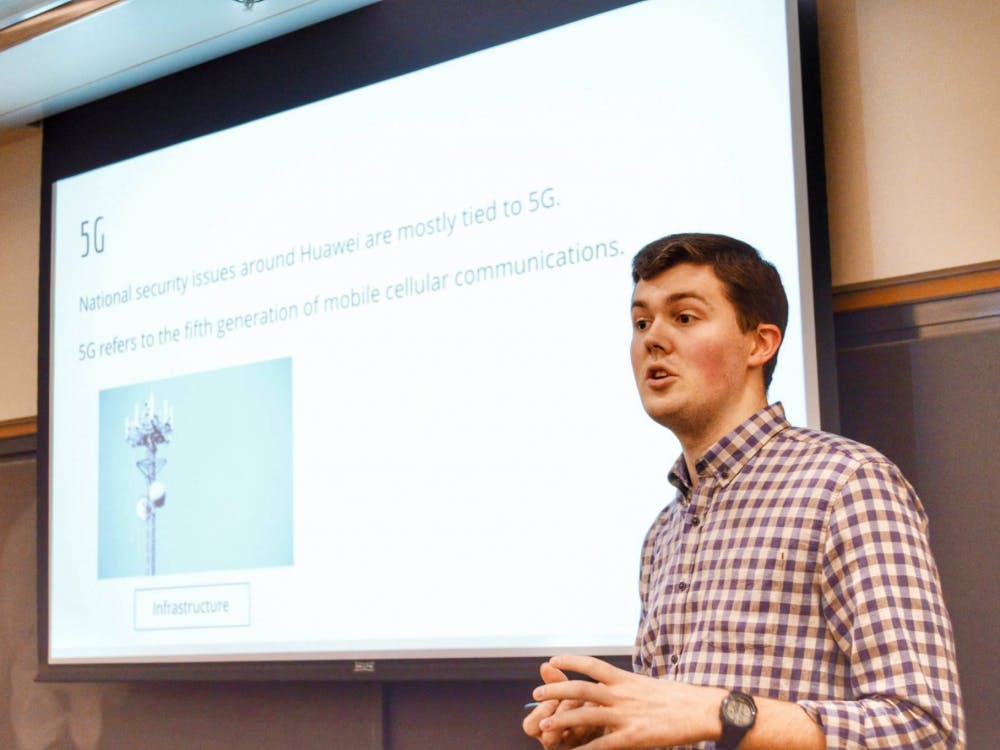A Duke senior is trailblazing efforts to make cybersecurity a field of study more accessible to the Duke community.
In 2018, Justin Sherman, the youngest Cybersecurity Policy Fellow at New America—a Washington, D.C. think tank—and a fellow at the Duke Center on Law and Technology, co-founded Duke’s Cyber Team and Cyber Club, which together make up the cyber arm of the American Grand Strategy program.
With computer technology touching important issues—like World Health Organization’s predictive algorithms used for modern diseases and sentencing algorithms in the justice system, Sherman believes that cybersecurity is “something you should understand a little bit about because the implications are really astronomical.”
The Cyber Club hosts public talks every few weeks, where students can hear from cybersecurity experts in fields ranging from academia and think tanks to government and private industry, such as Peter Singer, a strategist for new America, who spoke at a talk hosted by Cyber Club in October 2018.
Cyber Team, on the other hand, is the Cyber Club’s competitive subset, and the students accepted into the group spend meetings preparing mock security briefs and handling crisis simulations. In the long term, they are training for cyber strategy challenges and “‘war room’-like competitions” like the Atlantic Council’s Cyber 9/12 Strategy Challenge, according to the AGS website.
Senior and co-founder Becca Diluzio said that prior to the existence of the Cyber Arm, there was a shortage of educational and extracurricular opportunities available in cybersecurity. Because of their cyber interest, she said that she and Sherman were “lone wolves on campus.” While she brought in her experience related to public policy, she commented that Justin’s expertise in cybersecurity was invaluable to jumpstarting the initiative.
“It’s essentially like having a mid-level professional on campus who is leading the club and the team,” she said.
Peter Feaver, professor of political science and public policy as well as the director of the AGS program, said that the program was already looking to expand cybersecurity awareness, and given Sherman’s passion, they allowed him to take charge. He noted that not only has the program reached tech-based students who may not have considered the national security implications of cyber, but it has also encouraged students who are stronger with the policy side to connect as well.
Sherman and Diluzio mentioned that there are currently 500 members of the Cyber Club and increased application numbers for the Cyber Team. Despite the rise in student participation, they are cognizant about recruiting students from a variety of backgrounds and creating an inclusive space by promoting to different student groups and de-emphasizing the need for prior experience.
In particular, Sherman explained the larger motive behind diversifying the Club and Team—the homogeneity seen in technology and cybersecurity as a whole.
“[We’re] trying to get students more involved in that space who are from a variety of different backgrounds, with a variety of different perspectives, making that not just diverse but more inclusive,” Sherman said.
It was with this goal of bringing more diverse voices to the conversation in mind, as well as a wish to explore the emerging intersections between technology, that Justin co-founded Ethical Tech, a non-partisan initiative that focuses on research, education and policy.
According to InfoSec, the cybersecurity industry is suffering from a homogeneity problem, as the majority of analysts are white and/or male.
“That’s been something we’ve been focused on from the very beginning with Ethical Tech—bringing more women, more underrepresented groups to these conversations as well as making those conversations more accessible to people outside the tech sphere,” Sherman said.
He noted that with their events and projects such as the Speaker Series, Ethical Tech works to lower this barrier by making technical topics more accessible, because “it’s often perceived that these [topics] are more complex than they are sometimes, that you need a Ph.D. in computer science to understand.”
Sherman’s work has also brought cybersecurity into the classroom—he has co-written and taught the Cyber and Global Security Seminar House Course with Ines Jordan-Zoob, Trinity ‘19, and the Intro to Cyber Policy course that is currently taught by David Hoffman, a senior lecturing fellow, and Kim Kotlar, an adjunct instructor in the Sanford School of Public Policy.
As a teaching assistant for the latter, Sherman witnessed discussions surrounding data collection, moderating content, social media and copyright issues.
As for the future of engagement with cybersecurity on campus, Sherman is optimistic.
“We already have a massive growth in the number of applications and signups to our team and club this year, which is fantastic,” he said. “There’s also growing campus interest on the part of students and faculty towards the issues. I imagine in several years that there are more courses around this stuff, there are more extracurricular opportunities around this stuff and even just generally these technology issues are more integrated into the content of different course syllabi.”
Get The Chronicle straight to your inbox
Signup for our weekly newsletter. Cancel at any time.

